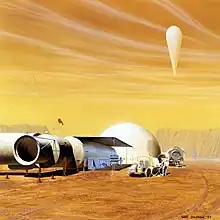
Mars Outpost is a concept for a human base on the planet Mars that was developed by the United States in the 1980s.[1] The components and design were based on an earlier lunar test bed outpost.[1] Development would go through several phases over four years, from an 'Emplacement Phase' to a 'Consolidation Phase', after which full use by its crew could commence.[1] Components of the base would include a habitat module, pressurized rover dock/equipment lock, airlocks, and a 16 meters (17 yards) constructed habitat.[1] The 16 m habitat would be constructed in situ.[1] Other technology for the base design includes a meteorological balloon, unpressurized rover, storage/work area, an area for geophysical experiments, and an area antenna.[1] The Mars Outpost would be designed for a crew of 7 astronauts.[1] Their main tasks would be to do research on mining of Mars and Phobos, life sciences, technology, and Solar System exploration.[1] The Office of Space Exploration did case studies that include establishing a human presence on another planet in 1988 and 1989.[2] An objective of the Mars Evolution 1989 study was, "Emplace a permanent, largely self-sufficient outpost on the surface of Mars."[2]
The base had three main phases called Emplacement, Consolidation, and Utilization.[3]